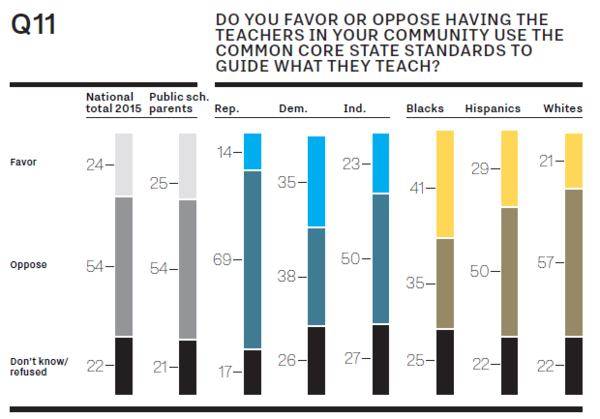The PDK/Gallup Poll Results That Matter for the K-12 Marketplace
We’ve been whipsawed a bit in recent weeks by survey results that offer somewhat contradictory findings about the public’s views of education, and testing in particular.
First came a recent Education Next poll that suggested that public antipathy toward testing, and interest in opting out, wasn’t as strong as rhetoric might suggest. But a new PDK/Gallup poll, released today, finds broad skepticism about testing, as well as the common-core standards. (See my colleague Corey Mitchell’s more complete breakdown of the results, with reaction.)
What does this mean for K-12 businesses?
It’s probably safe to assume that K-12 companies involved in assessment, curriculum, and other areas aren’t going to be making strategic decisions based on a few survey results, however compelling.
But nor can companies gloss over results entirely. Public sentiment tends to press upward and force political action by policymakers—who take steps at the federal, state, and local levels that have a direct impact on the market for standards, testing, and curriculum.
So what are some of the results in the PDK/Gallup poll that K-12 companies should be paying attention to? Here’s a selected sample:
- Standardized tests take a beating. Sixty-seven percent of public school parents say there’s too much emphasis on testing in schools, though black and Hispanic respondents have a more favorable view than whites—a result that pervaded different findings in the PDK/Gallup poll.
- Mixed views on opt-outs. Forty-seven percent of public school parents say there should be an option for excusing children from standardized tests; 40 percent say that shouldn’t be allowed. Black and Hispanic parents are more skeptical of opting out, suggesting they see more value in standardized exams.
- Engaging schools are better schools? A strong majority of public school parents, 80 percent, say student engagement with classwork should be a top measure of public school effectiveness—far more than those who see test performance, or prospects for immediate post-graduation employment that way.
- Show your work! Asked which measures provide the most accurate picture of students’ academic progress, the largest number of respondents—37 percent of public schools parents—favored examples of students’ work, over written observations by teachers, grades, and standardized test scores.
- A majority oppose the common core. Fifty-four percent of public school parents say they oppose having teachers use the common-core standards to guide what they teach, compared with just 25 percent in favor. Yet black parents are much more favorably inclined toward the common core than whites, the poll found. See below:
- Good teachers, good curriculum matter. Those two factors ranked high in parents’ opinions of how they choose schools, followed by schools holding the line on student discipline, and class size. Factors such as the size of the school, and standardized test performance did not fare as well.
- Worries about school funding. Asked about the biggest problems with public schools in their communities, the largest number of public school parents, 24 percent, say lack of financial support. Worries about standards/quality of education was second, with 10 percent. Lack of discipline, and lack of parental support (perhaps not surprisingly, given the audience) barely registered.
The poll is based on a nationally representative, Web-based survey of 3,499 Americans, and a phone survey of 1,001 Americans, all of whom were ages 18 and older. The margin of sampling error for the phone survey was 4.8 percent; for the Web-based poll, it was 3 percent.
Some of these results won’t surprise the business community. But they’re one indication of where public sentiment stands, and where K-12 policy may be going in the years ahead.


Some fairytale bliss Just something I can turn to https://theimpossible-quizbest.com